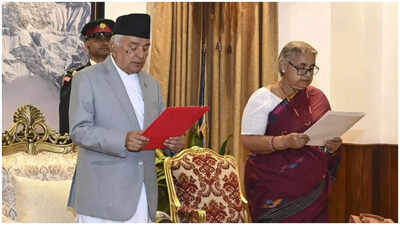ARTICLE AD BOX

Nepal's President Ram Chandra Poudel dissolved the parliament following a recommendation by the interim government led by former Supreme Court chief justice Sushila Karki, and also announced that fresh elections will be held on March 5 next year.President's decision to dissolve parliament received backlash from several parties. Major political parties denounced his decision, calling it “unconstitutional” and a “blow to democracy," PTI reported. Karki, 73, was sworn in on Friday night as Nepal’s first woman prime minister, ending days of political uncertainty after the abrupt resignation of KP Sharma Oli this week amid widespread anti-government protests over a social media ban and alleged corruption. Oli stepped down on Tuesday shortly after hundreds of demonstrators entered his office demanding his resignation. More than 50 people were killed in the nationwide protests. Almost all leading political parties, including the Nepali Congress, the Communist Party of Nepal (Unified Marxist–Leninist) and the Communist Party of Nepal (Maoist Centre), condemned the dissolution, as per PTI. “This move to dissolve parliament is against the spirit of our Constitution and the interpretation of the Supreme Court.
It is absolutely unconstitutional,” the Nepali Congress said in a statement. According to a notification from the President’s Office, parliament stood dissolved with effect from 11 pm on September 12. Even as political tensions remained high in Kathmandu, normalcy began returning with curfew and restrictive orders lifted.Karki is expected to form a small Cabinet on Sunday and will hold about two dozen ministries—including home, foreign affairs and defence—according to sources. With the Prime Minister’s Office in Singhdurbar Secretariat damaged in the unrest, the newly built Home Ministry premises within the complex are being prepared for her office. The agitation, which began Monday against a government social-media ban, quickly expanded into a broader movement reflecting public anger over corruption and political apathy.



.png)
.png)
.png)
















 2 hours ago
4
2 hours ago
4








 English (US) ·
English (US) ·